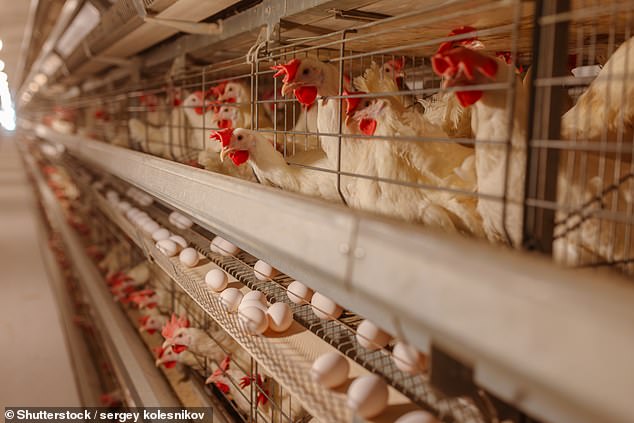Can bird flu be caught through eating chicken and eggs? All you need to know about the crisis gripping Australia’s poultry farms
With more than 500,000 chickens slaughtered following an outbreak of bird flu on three Victorian farms, many Australians are rightly concerned about the safety of the food they eat.
Tensions rose when a child returning from India was confirmed as Australia’s first case of bird flu A(H5N1), which has led to widespread bird deaths worldwide.
Coles shoppers have been limited to buying two cartons of eggs due to supply chain issues following the outbreak in Victoria, leading to increased scrutiny of the crisis gripping Australian poultry businesses.
Since bird flu can also spread to cows, the main question on people’s minds is: Can bird flu be contracted by eating chicken and eggs, or by drinking milk?
With more than 500,000 chickens slaughtered following an outbreak of bird flu on two Victorian farms, many Australians are concerned about the safety of the food they eat (stock image)
How safe is chicken?
Since last month, there have been four outbreaks on Victorian poultry farms (three with H7N3 bird flu, one with H7N9) and one in Western Australia, H9N2).
These bird flu strains can infect humans, but this is very rare and is usually caused by close contact with infected live birds or contaminated areas.
This means that there is very little chance of catching bird flu from chicken meat.
But as Professor Enzo Palombo of Swinburne University further wrote The conversation“It is time to remind people to handle chicken meat with care as many dangerous pathogens, such as salmonella and campylobacter, can be found on chicken carcasses.”
Chicken meat should always be handled carefully when shopping, transporting it home and storing it in the kitchen.
When transporting meat, it is wise to use a cool bag and store it in the refrigerator or freezer within two hours.
Do not wash the chicken before cooking to prevent the spread of disease-causing microbes in the kitchen.
Finally, cook the chicken thoroughly, as viruses such as bird flu cannot survive cooking temperatures.
What about eggs?
Flu viruses can contaminate chicken eggs and possibly spread bird flu.
The viruses can enter through the eggshell because the particles of the influenza virus are smaller (100 nanometers) than the pores in the eggshells (at least 200 nanometers).
This means that the viruses are not removed by cleaning the outside of the egg. So it is best to boil the eggs instead of eating them raw.
The U.S. Food and Drug Administration recommends cooking poultry, eggs and other animal products to the proper temperature and avoiding cross-contamination between raw and cooked foods.

Tensions rose when a child returning from India was confirmed as Australia’s first case of bird flu A (H5N1), which has led to widespread bird deaths worldwide. Chickens on a poultry farm are depicted
Is milk safe?
In Australia, where bird flu has not yet been reported in dairy cattle, it is safe to drink milk and milk products because they are pasteurized.
“While there is little direct research on whether pasteurization inactivates H5N1 in milk, we can extrapolate from what we know about heat inactivation of H5N1 in chicken and eggs,” the professor wrote.
‘We can therefore be confident that there is no risk of transmission of bird flu via pasteurized milk or milk products.’
More than 80 dairy farms in at least nine US states have been infected with the H5N1 version of the bird flu virus.
Infected birds can shed the virus through their saliva, nasal secretions and feces, so bird flu can contaminate animal food products during processing and production.
But Prof. Palombo wrote that “the spread of bird flu among livestock, and possibly humans, is likely caused by contact with contaminated milking equipment, and not by the milk itself.”
The test used to detect the virus in milk is highly sensitive, meaning it can detect very low levels of bird flu genetic material (RNA).
But the test does not distinguish between live or inactivated virus, only that the RNA is present, so based on that test alone it is not possible to determine whether the virus found in milk is contagious and can infect humans.
In conclusion, Prof Palombo said: ‘If you consume pasteurized milk products and cook your chicken and eggs thoroughly, you have nothing to worry about as bird flu is inactivated by heat.’

After Australia recorded its first human case of a bird flu strain (estimated) that is spreading globally, Australians are being warned about the symptoms they should be aware of.

